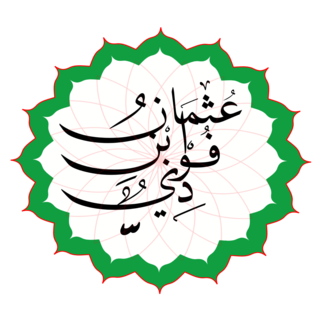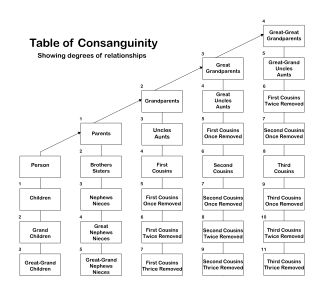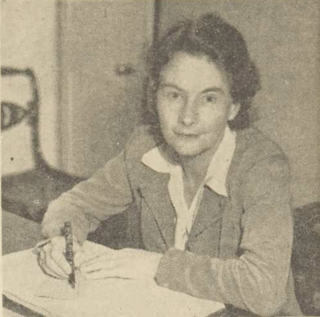
Margaret Mead was an American cultural anthropologist who featured frequently as an author and speaker in the mass media during the 1960s and 1970s. She earned her bachelor's degree at Barnard College in New York City and her MA and PhD degrees from Columbia University. Mead served as President of the American Association for the Advancement of Science in 1975.

Shehu Usman ɗan Fodio, born Usman ɓi Fudi, was a Fulani scholar, religious teacher, revolutionary, military leader, writer, promoter of Sunni Islam, and the founder of the Sokoto Caliphate.

Islam is one of the largest religions in Nigeria. It is one of the two main religions practised in Nigeria, the other being Christianity. Nigeria has the largest Muslim population in West Africa. In 2018, CIA estimated that there is over 49.5% Muslims out of the total population of Nigeria. In 2007, the BBC estimated that slightly over 50% of the population is Christian. Muslims in Nigeria are predominantly Sunnis of the Maliki school of thought. However, there is a significant Shia minority, primarily in Kaduna, Kano, Katsina, Osun, Ilorin and Sokoto states. In particular, a 2009 Pew Forum survey on religious diversity identified 5% of Nigerian Muslims as Shia.

Aminatu was a Hausa Muslim a historical figure in the city-state Zazzau, in what is now in the north-west region of Nigeria. She might have ruled in the mid-sixteenth century. A controversial figure whose existence has been questioned by some historians, her real biography has been somewhat obscured by subsequent legends and folk tales.
Polly Hill was a British social anthropologist of West Africa, and an Emeritus Fellow of Clare Hall, Cambridge.

Michael Garfield Smith OM was a Jamaican social anthropologist and poet of international repute.
Sidney Wilfred Mintz was an American anthropologist best known for his studies of the Caribbean, creolization, and the anthropology of food. Mintz received his PhD at Columbia University in 1951 and conducted his primary fieldwork among sugar-cane workers in Puerto Rico. Later expanding his ethnographic research to Haiti and Jamaica, he produced historical and ethnographic studies of slavery and global capitalism, cultural hybridity, Caribbean peasants, and the political economy of food commodities. He taught for two decades at Yale University before helping to found the Anthropology Department at Johns Hopkins University, where he remained for the duration of his career. Mintz's history of sugar, Sweetness and Power, is considered one of the most influential publications in cultural anthropology and food studies.

Leila Ahmed ; is an Egyptian-American scholar of Islam. In 1992 she published her book Women and Gender in Islam, which is regarded as a seminal historical analysis of the position of women in Arab Muslim societies. She became the first professor of women's studies in religion at Harvard Divinity School in 1999, and has held the Victor S. Thomas Professor of Divinity chair since 2003. In 2013, Ahmed received the University of Louisville Grawemeyer Award in Religion for her analysis of the "veiling" of Muslim women in the United States, in which she described her rejection of her own previous critiques of the veil as sexist in favor of the view that the veil, when voluntarily chosen, is a progressive and feminist act. As such, she now supports Muslim women who advocate for the veil as a symbol of progressivism and feminism, although Ahmed herself does not practice veiling.

A cousin marriage is a marriage where the spouses are cousins. The practice was common in earlier times, and continues to be common in some societies today, though in some jurisdictions such marriages are prohibited. Worldwide, more than 10% of marriages are between first or second cousins. Cousin marriage is an important topic in anthropology and alliance theory.
Feminist anthropology is a four-field approach to anthropology that seeks to transform research findings, anthropological hiring practices, and the scholarly production of knowledge, using insights from feminist theory. Simultaneously, feminist anthropology challenges essentialist feminist theories developed in Europe and America. While feminists practiced cultural anthropology since its inception, it was not until the 1970s that feminist anthropology was formally recognized as a subdiscipline of anthropology. Since then, it has developed its own subsection of the American Anthropological Association – the Association for Feminist Anthropology – and its own publication, Feminist Anthropology. Their former journal Voices is now defunct.

Sister exchange is a type of marriage agreement where two sets of siblings marry each other. In order to get married, a man needs to persuade his sister to marry the bride's brother. It is practised as a primary method of organising marriages in 3% of the world's societies: in Australia, Melanesia, Amazonia and Sub-Saharan Africa; and can replace other methods in 1.4% of the societies.
Teknonymy, hence the noun teknonym or teknonymic, more often known as a paedonymic, is the practice of referring to parents by the names of their children. This practice can be found in many different cultures around the world. The term was coined by anthropologist Edward Burnett Tylor in an 1889 paper.

The Hausa are the largest ethnic group in sub-Saharan Africa with the second most spoken language after Arabic in the Afro-Asiatic language family. The Hausa are a diverse but culturally homogeneous people based primarily in the Sahelian and the sparse savanna areas of southern Niger and northern Nigeria respectively, numbering over 80 million people with significant indigenized populations in Benin, Cameroon, Ivory Coast, Chad, Sudan, Central African Republic, Republic of the Congo, Togo, Ghana, Eritrea, Equatorial Guinea, Gabon, Senegal and the Gambia.

Phyllis Mary Kaberry was a social anthropologist who dedicated her work to the study of women in various societies. Particularly with her work in both Australia and Africa, she paved the way for a feminist approach in anthropological studies. Her research on the sacred life and significant role of the Aboriginal women of Australia proved to be a controversial topic, as anthropology during her years of early fieldwork was male-dominated, filled with the misconceptions that men were the superior in any aspect of life. Contributing proof of women's significance to societal development and organisation, Kaberry can be defined as an influential and significant anthropologist.

Nana Asmaʾu was a Fula princess, poet, teacher, and a daughter of the founder of the Sokoto Caliphate, Usman dan Fodio. She remains a revered figure in northern Nigeria. She is held up by some as an example of education and independence of women possible under Islam, and by others as a precursor to modern feminism in Africa.

Sir Herbert Richmond Palmer was an English barrister, who became a colonial supervisor for Britain during the inter-World War period. He served as a Lieutenant Governor in Nigeria, Governor and Commander-in-Chief of The Gambia and Governor and Commander-in-Chief of Cyprus.
This article is about traditional Hausa medicine practised by the Hausa people of West Africa.
Hausa animism, "Maguzanci" or Bori is a pre-Islamic traditional religion of the Hausa people of West Africa that involves magic and spirit possession. Most of the adherents of the religion accepted Islam after the 18th century Jihad by the Islamic reformer Usman dan Fodio.
Saude Abdullahi-Aliyu born in 1952, is a princess of the Fulani royal family of Wudil, a Nigerian educator and farmer, she is the first woman of Kano State descent to hold the position of a Federal Principal and a Federal Director of Education at the Federal Ministry of Education and the first Woman University graduate from Wudil Local Government of Kano State in North-West, Nigeria.












